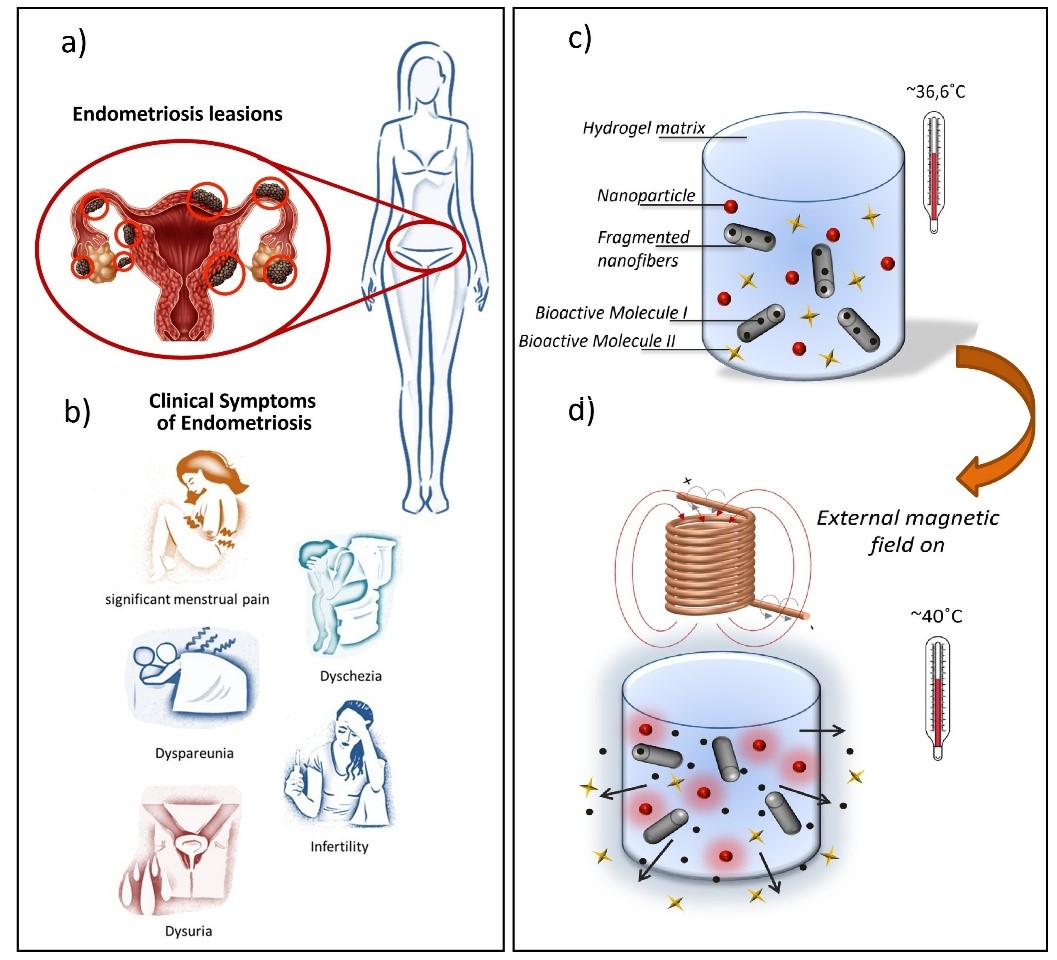Project title: Hybrid materials responsive to external stimuli for local drug delivery in endometriosis treatment - analysis of selected properties and effectiveness in vitro and in vivo conditions
Grant Number: 2022/47/D/ST5/01395
Project manager: PhD Eng. Olga Urbanek-Świderska
PhD Eng. Olga Urbanek-Świderska, assistant professor conducting research work in our laboratory, is the laureate of the SONATA program financed by the National Science Centre. The SONATA program is a competition for research projects, intended for scientists who obtained a doctoral degree between 2 and 7 years before the year of application. Applicants can apply for funding for projects involving basic research, lasting 12 months, 24 months, or 36 months. Applications for the competition may be submitted covering basic research in an area specified in one of the 25 NCN panels, covering three main categories such as Humanities, Social Sciences, and Arts, Science and Technology, and Life Sciences. PhD Eng. Olga Urbanek-Świderska has applied for a grant within the category of Science and Technology. In the panel selected by the project manager (ST5-Materials), 114 projects were submitted, of which 40 passed to the second stage of evaluation and 15 ultimately received funding. The list of laureates is available on the National Science Centre website: https://ncn.gov.pl/konkursy/wyniki/2023-05-18-opus24-sonata18.
The project is focused on the development of novel drug delivery systems for endometriosis treatment. Endometriosis is a disease in which cells of the endometrium, the tissue lining the uterus, form inflammatory lesions outside the uterine cavity, e.g., on the ovaries, bowels, or even skin (Fig.1a). This chronic and hormone-dependent disease is characterized by symptoms such as severe pain during menstruation, pain during intercourse, and infertility (Fig.1b). About 10% (190 million) of the world's female population being in reproductive age suffers from endometriosis. In the most severe cases, endometrial lesions should be removed surgically. Unfortunately, this procedure does not guarantee success, because this disease recurs easily. It has been estimated that the frequency of endometriosis recurrences is 21.5% at 2 years after the procedure and 40–50% within 5 years.

Figure 1. a) Scheme of uterine and endometriotic changes, occurring within female internal reproductive organs; b) Scheme illustrating clinical symptoms of endometriosis; c) The scheme of proposed injectable hybrid drug delivery system, supporting current surgical procedures of endometriosis treatment; d) The external alternating magnetic field stimulation causes the local increase of temperature, leading to the DDS structure changes and drug release.
The project aims to develop and analyze the properties of a hybrid material for local, on-demand drug delivery that could be used in the treatment or supporting therapy of endometriosis. A novel dual drug delivery system (DDS) based on nanofibers and hydrogel will be designed. The nanofibers will be loaded with selected bioactive molecules, e.g., which reduce the viability of endometriotic cells. Anti-CTLA4 antibodies placed in a hydrogel should suppress the local inflammation associated with the disease (Fig.1c, 1d). Additionally, a new route of administration of the known bioactive substances may be more effective. So far, the research conducted on drug development has confirmed that the change of the administration route may change the effectiveness of the drug. To achieve the project's aims, the work is divided into five phases: material development and optimization (phase I), properties characterization (phase II and III) and in vitro (phase IV), and in vivo testing (phase V). Within the project, an extensive study of drug release kinetics, mucoadhesion (interaction with the mucosa), and degradation profile will be conducted, as well as in vitro and in vivo experiments.
It is expected that, as a result of the project, a novel hybrid biomaterial revealing an appropriate mucoadhesion and drug release profile of bioactive substances will be developed. The substances released from the DDS will effectively inhibit the proliferation and activity of endometriotic cells and regulatory T lymphocytes. In vivo tests will be carried out on a small animal model to initially verify the safety and effectiveness of the developed material.
The project started in June 2023 and is planned for 36 months. Nacional Science Centre provides project financing of 920,490 PLN.
